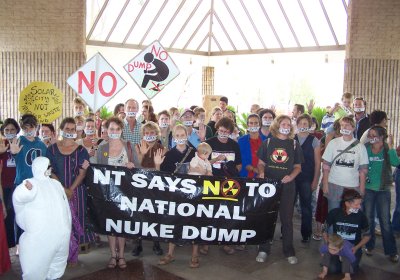A group of Christian activists, charged with entering the top secret Pine Gap Joint Defence Facility near Alice Springs, have been found guilty. In a separate trial, a man has been found guilty of the same offence. They all face a maximum sentence of seven years’ jail.
Mparntwe/Alice Springs
South Australian Yankunytjatjara elder and activist Yami Lester, who was blinded as a teenager by dust from the Maralinga nuclear bomb tests in the 1950s, died on July 21 in Alice Springs, aged 75.
His family said his death "leaves an incredible legacy of better global understanding of the devastation of nuclear bombs and for the ongoing battle for recognition of the consequences of them".
The following is a statement issued by participants of the StandUp2017 conference that concluded with a rally in Mbantua (Alice Springs) on June 26.
* * *
Rosalie Kunoth Monks: “You better believe it, when the Intervention first hit in 2007 community councils were decimated.”
Matthew Ryan: “Trying to get the government to listen to us, is like a brick wall.”
Dylan Voller joined a small crowd protesting against the conditions in NT detention centres as the Royal Commission into Juvenile Justice resumed hearings in Alice Springs on March 13.
Footage broadcast on the ABC showing Voller being tear-gassed, spit-hooded and shackled to a restraint chair prompted Prime Minister Malcolm Turnbull to call the inquiry.
Speaking outside the commission, Voller said he wanted to support the other young people giving evidence.
The six “peace pilgrims” who were arrested last September on the Pine Gap US military intelligence base, near Alice Springs, have now received court summons.
Jim Dowling, Andy Paine, Tim Webb and Franz Dowling of Brisbane and Margaret Pestorius and Paul Christie of Cairns are each charged with trespass under the Defence (Special Undertakings) Act and face maximum penalties of between seven and 14 years in prison.
More than 100 people rallied at Todd Mall, Alice Springs, against youth incarceration and torture on October 11. The national day of protest included actions in Darwin, Newcastle, Adelaide and Sydney and coincided with the first day of the Royal Commission into youth detention in the Northern Territory.
Beginning on September 26, International Day for the Total Elimination of Nuclear Weapons, hundreds of peace activists converged on the Pine Gap Joint Defence Facility, less than 20 kilometres from Alice Springs, to expose its role in war, surveillance and nuclear targeting.
Three “Quaker Grannies for Peace” set up breakfast on the road to Pine Gap on September 26 and invited military personnel arriving for work at the base to sit down with them.
The action is one of a series of events marking the 50th anniversary of the secret US military facility at Pine Gap, by groups advocating for the base’s closure.
- Page 1
- Next page











